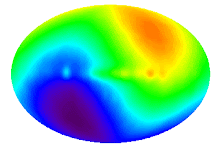concept about how a failing kidney and the intestinal
microbiota affect each other
Under physiological
conditions, the predominance of symbiotic bacteria, an intact intestinal
barrier, defensins production, mucus integrity, and immunoglobulin A (IgA)
secretion support the symbiosis between the host and its gut microbiota. An
intramural innate immunity controls pathobiont overgrowth inside the lumen of
the intestinal tract. (Right part) The metabolic changes that are associated
with the progression of chronic kidney disease (CKD) to end-stage renal disease
(ESRD) change the balance of symbionts and pathobionts in a way that favors
pathobiont overgrowth, that is dysbiosis. Pathobiont overgrowth induces
inflammation and loss of barrier function that in turn promotes increased
translocation of bacterial components and even living bacteria into the host’s
internal environment. This process will activate innate immunity characterized
by production of proinflammatory cytokines that define a state of systemic
inflammation. This process potentially modulates a number of clinically
relevant processes in CKD such as the progression of CKD, accelerated
atherogenesis, and protein wasting.
‘Endotoxin tolerance’ or transient versus persistent
activation of innate immunity
Transient activation
of, for example, Toll-like receptors (TLRs) stimulates nuclear factor
(NF)-κB-dependent secretion of proinflammatory cytokines that triggers systemic
inflammation. Repeated or persistent TLR stimulation of monocytes and
macrophages induces ‘tolerance’ or ‘compensatory anti-inflammatory syndrome’
that defines a refractory status of the innate immune system. It appears that
in chronic kidney disease/end-stage renal disease (CKD/ESRD), both elements of innate immune activation and acquired
immunosuppression coexist because some leukocytes are massively activated
whereas others remain deactivated. This results in the clinical syndrome of
persistent inflammation accompanied by an immunosuppressive state. IL,
interleukin; TGF-β, transforming growth factor-β.

沒有留言:
張貼留言